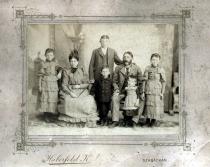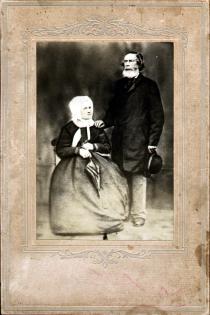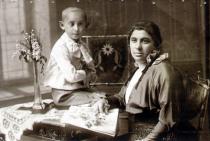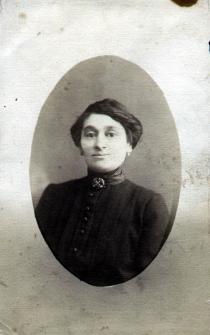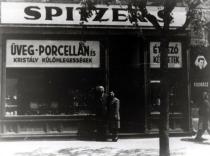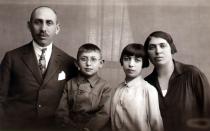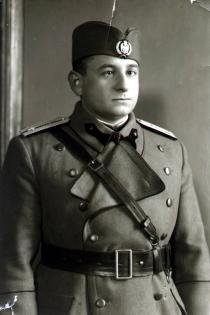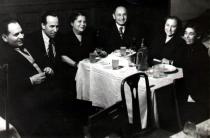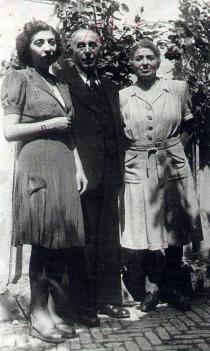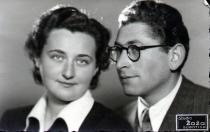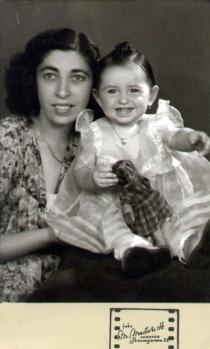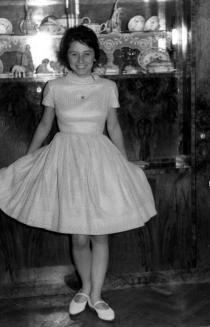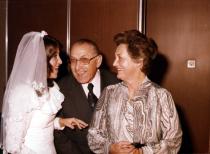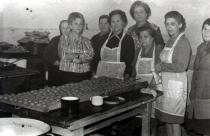
Dora Rozenberg
Subotica
Serbia
Interviewer: Nina Poljakovic
I know a bit about the origins of my paternal great grandmother and great grandfather. My great grandfather was Gaspar Spitzer, and his wife Betti Hirsch - married name Spitzer. They were middle-class merchants; they had a shop where one could find everything from groceries to household chemistry. Since the towns were smaller and shops like that one were rare, the business was good. They had five or six children but I do not remember their names other than my grandfather’s, Mor Spitzer. They were quite religious, they kept kosher and observed all the Jewish holidays, but unfortunately I don`t know how, when and where.
My paternal grandfather Mor Spitzer, was born in Subotica and lived on the Tompa farm, a small place in Vojvodina. His wife was Mimi – Marija Koh, married name Spitzer. She, unfortunately, died very young, at 40, from galloping consumption. She was a beautiful and strong woman, who kept the family on her shoulders. She left behind five children. They lived on a farm, at that time Jews did all sorts of things; they worked with meat, textiles, and tools which they used to sell in the village. They didn’t have an actual shop but it was known you could get everything you needed in their house and they even had inns.
Since it was a bohemian age, so to speak, where local people liked to spend all night at an inn making trouble, my grandmother tried to prevent it and succeeded most of the times by having gendarmerie on stand-by. I remember that after she died the chief of gendarmerie used to come to my father and tell him how she was a wonderful, energetic person, and we have always suspected that he was in love with her. They were pretty well-off materially while great grandmother was alive. After her death grandfather sold everything they had, he let the children go wild, without giving them anything, and became an alcoholic.
Their mother tongue was Hungarian and that was what they spoke at home. They were very religious, but you could not tell this from their dress. They were Neologs1. They kept kosher at home and, went to synagogue. They celebrated every holiday very strictly. They lit candles, made challah on Fridays, Shabbat was observed, etc.
They were members of the Jewish community but since the farm was very far away they did not socialize much, except for holidays when the family gathered together. They had a woman who sometimes came to help grandmother clean the house, and a woman who took care of the work outside. At that time it was not the practice to have a woman to take care of all the household activities. Grandmother died from her own carelessness. One winter the laundress did not come so she cleaned everything for the household (for five children and two adults) by herself in the yard, she caught a cold and died a short time later on Purim. After that the family fell apart but grandfather never married again, in fact he was so ill they amputated one of his legs. He was in a wheelchair for the rest of his life, until he was 75 or 77 years old. Grandmother and grandfather had siblings but I do not remember anything about them.
My maternal grandfather was named Salamon Merkler. He had nine children; he was widowed with five children and then married my grandmother, the most wonderful person in the world. Her name was Lujza Bek, she was born in Kiskunmajsa [Hungary] and she had four children with grandfather. She was a wonderful woman because she accepted grandfather’s children as her own. In fact when the grandchildren who were not hers went to visit them, they would not say they were going to grandfather’s but said they were going to grandmother’s. Grandfather was born around 1870 and grandmother was 18 or 20 years younger than grandfather. They lived in Cantavir, a village near Subotica. It was a wealthy village since there lived people with big households, it is as wealthy today actually. There lived quite a few Jews, 15-20 families for certain, but there was no synagogue, only one house represented the place of worship. Of course, there was no Jewish school in the village so the children went to Subotica to school. Jews in the village lived together with other ethnic backgrounds and had good relations. Grandmother and grandfather had a house and since he was a tinsmith he had his own workshop, while grandmother was a housewife and took care of the house and of the cows that they had at home. She could not work because she took care of the nine children. Two of the sons were also tinsmiths and worked with their father in the workshop.
Grandfather was a religious man; he knew the customs and religion itself. He dressed in everyday clothes. He probably wore kipa in the house and especially during the prayings, but never out on the streets, nor did he wear kaftan or payot, since they were not orthodox. Grandmother acted the same way. When he was young he went to cheder and had a special teacher who taught him about Jewish traditions and customs. Grandfather and grandmother were kosher, they kept Shabbat, went to synagogue, especially grandfather who went there every night and who strictly maintained orthodox customs. They never told me what the holidays looked like in their house. When they moved to Subotica they could buy kosher meat and eat kosher food. They were members of the Jewish community but they were never involved in politics, nobody harrased them and they lived quite well. They had two Christian women who helped grandmother with the cleaning, and taking care of the nine children and since they had a barn with cows they needed the attention too. They had a large garden with vegetables and my grandmother just couldn`t manage it alone, so the older girls helped grandmother in the kitchen and took care of the younger children. They were surrounded by Christians and had good relations with them, there were never incidents nor they have been called out for being Jewish. They did not use to visit each other since they all worked all day long so there was no time for socializing. The part of the house where we lived had street windows and behind it, down the yard, was the workshop. I remember the yard itself. There were a lot of fruit trees, and when there was summer they used to put a large tin tub, for me to bathe in, under the trees.
The thing I remember from grandmother and grandfather’s is Friday evening (Shabbat). When I was in the concentration camp, I always dreamed about that and sometimes it was what kept me alive; seeing the table set, the candles burning, the smell of challah. We did not have a ring-cake, instead grandmother made crescents with cinnamon, they were enormous, or at least they seemed that way to me. I could not get a bite until grandfather came home from synagogue. When he came home he blessed us, grandmother had already lit the candles as was the custom and she served dinner. Since grandfather was old and was not allowed to eat everything, we always had dairy dinners. I can still smell those crescents. In the camps when I closed my eyes and remembered the smell I was no longer so hungry. This is something I have remembered through all the periods of my life up until today.
Grandfather’s only sister was named aunt Lenci. She lived in Cantavir at her son`s who had four children (Zsiga, Margit, Rozsa and Ilus) and two grandchildren who were born after Lenci`s death. Margit, Rozsa and Ilus were sewers and lived in our neighborhood. Lenci was short, and she wore an apron as all the village women did. She died around 1920.
Grandmother had many brothers and sisters, around five or six. We liked uncle Maksi most. He was a huge man, a good man and he loved the family. My mother, father, brother and I used to go often at his place or he came to ours. There couldn’t pass a Sunday for us not to see each other.
My father Salamon Spitzer, called Sanjika, was born on February 18, 1888 in Subotica. His native tongue was Hungarian but he also spoke German. He finished the sixth grade of elementary school and was unable to continue his studies because as a youngster he suffered a lot. When his mother died, his father left him too. Being very poor he was often hungry for days and was even going barefoot in snow and cold because there was no one to take care of him. At the age of seven he lived with his aunt in Subotica, who was mean and treated him very poorly. Her husband was no better, and since they have not had children of their own, they did not now how to treat him. He lived with them until he was independent enough. When he finished sixth grade of the elementary school he started working at first as an apprentice in a glass-shop owned by a Jew, who was named Kohn. Kohn was a good man and he even helped my father in his growing up by supporting him materially. He made good progress and when he married my mother they opened a small workshop with minimal start-up capital. Because of his modesty they succeeded to build that small workshop into the biggest glassworks in the region with a shop in Subotica. When my father made inventory in his shop he took a box of matches from his pocket and said while looking at them: “Why do I need to make inventory? I started with these and everything above that is profit.”
My mother Cecilia Merkler, known as Cilika, was born in Cantavir on September 29, 1890. She was the sixth child in the family and my grandmother`s first. She spoke Hungarian and she finished the sixth grade of elementary school. She helped a lot around the house, and was very hard working. Mother knew knitting, and after she finished her school she often used to knit. I think that they met in the same manner that all Jews did back then, a shadchan introduced them. They married in Cantavir on March 17, 1914. in the small synagogue. When the war broke out in the fall, several months after their wedding, father was called for military service. Since my mother was pregnant with me she went back to stay with her parents and waited for him to come back from the war.
Father had three sisters and one brother. The eldest was Jozi, then Franciska, Ida, and Margit. Except for one sister, aunt Fani (Franciska) who was with me in the camp, they were all lost during the war. She was the only one to return. I do not know what she did. One sister, Ida, did not have a family because when she was four years old she was stricken with typhus and remained mentally impaired from that. Everybody else was lost in camps during the war. The only thing I know is that Margita’s granddaughter returned from the camp and she lives in London. We even had telephone contacts, but as the time went by we lost our connection.
Mother had brothers, sisters and step-siblings. Emma, Herman, Zsiga, Janka, Miska were step-siblings and Marton, Karoly, Cilka, Rozika were her brothers and sisters. Only my mother and Zsiga returned from the camps. Zsiga was a tinsmith and he lived in Subotica. He has a daughter Marta, who has two daughters in Israel and 7 grandchildren. The eldest sister Emma lived in Budapest and had four children. Uncle Herman lived in Szeged [Hungary] and had one daughter. Miska was deported to Austria and he did not live to see the liberation. Rozsika lived in Belgrade and had two daughters. She stayed with one daughter in Belgrade and they were executed at Sajmiste camp (a factory yard in Belgrade set up by the Germans for massacring Jews after the occupation of March 1941), while the other came to Subotica. She lives in Israel today with her family and has 8 grandchildren.
I was born in Cantavir on January 3, 1915, but I lived in Subotica. During W.W.I., before I was born, my father had been drafted into the war. Mother returned to her parents where I was born. I lived in Cantavir in my grandmother’s house until I was four years old.
As soon as the First World War ended father, mother and I went to Subotica. Subotica had about 100,000 residents 6,000 of which were Jews. Jews did not have their own special section of the town rather they lived all over the city.
There were two Jewish communities in the city, one Orthodox and the other Neolog. My family was part of the Neolog community. The synagogue, where religious services held, had already been there when we came to Subotica and that is where the religious services were held. The community had its own chazan, rabbi, shochet and the Orthodox community had a mikvah. Our women went to the public bathhouse. At that time there was public health care for children and a communal kitchen for the poor. There was a Jewish elementary school where I went. Orthodox boys went to yeshiva.
My parents were not very religious. We observed Shabbat and the high holidays, but we were not kosher. I remember the Sabbath at home. We used to cook the whole day on Friday only for the evening because my mother never cooked on Saturdays. I used to light the candles with my mother – four of them. Two for her and two for me. The smell of challah defined Friday nights for me. When I was a bit older I always went with my girlfriends to service in Synagogue, and when there was school on Saturdays, there had always been service for children afterwards.
When we came to Subotica Jews mostly worked in commerce although there were a few craftsmen. At that time there was no plumbing, but we had a well and we even had our own motor, which drew the water. Our material status was very good. She [my mother] did not work. She was a housewife. We could go on summer vacations every year especially to the seaside where my mother took my brother and me. My father was unable to come because he could not leave the store. At one point we even had a villa at Palic2 so we spent a lot of time at the lake and there were even times when we spent the whole summer there.
Proof of our good material standing was that for three years I was educated in a woman’s educational institute because mother had to help father in the store and she did not want to leave me alone. We lived in a big house with four rooms and a hall. The most beautiful part of the house was the living room with plenty of daylight. We used to listen to the radio there and enjoy being together as a family. We had a bedroom where my mother brought the furniture when she married. I also had my own room, a real modern girl’s room with bed closets and a table. The dining room had furniture, which was all carved and beautifully designed. There were also my brother’s room and a bathroom. At the end of the garden we had a separate part of the house, an apartment, which was used for storage. The house had roses, grapevines, and we had a dog. Since we could indulge ourselves we had a full-time housekeeper who lived with us, but she was not permitted to cook because mother did that herself.
We had prayer books as well as secular books. We did not need to use the library because we bought all the books we wanted to read. My brother and I spent all of our pocket money on books. We used to read all the popular books in Hungarian and we always talked over our “shopping,” and all our pocket money was used for books. We collected over 350 books. At that time there were paper-deliverers so my parents used to read newspapers too. We were not very religious but we celebrated every holiday. Friday nights the candles burned, we made challah and ring cakes. We went to the Jewish community on Chanukah and Purim Pesach. We fasted on Yom Kippur. Even today I fast, although it is much more difficult than earlier. For such great holidays, the shop was closed and everything was very festive. After the synagogue we would always go to uncle Maksi`s and celebrate the holiday together with all my uncles and aunts. Mother and father were never involved in politics but my mother’s nephew was a communist. His name was Dr. Imre Ber. He was a surgeon, he wrote books, he taught at the Moscow University, and his textbooks were used. He was liquidated during Stalin’s reign.
Some of our relatives we saw every day. I used to see Aunt Rozsi, as well as mother`s cousin Adam Giza, who often visited us in the shop. When three of them got together, mother had to do at least some handwork, she could not sit and rest. Of course, she did not work on Saturdays or holidays. It wasn`t too fun for me, because they had children much younger than me, and I was the only one to take care of them. On the other hand, other friends we saw only for holidays. Many of them lived in Budapest or Szeged in Hungary, so we did not have many occasions to see them. But since our family was big, we actually have not even had the need to socialize with other people, while friends used to come to shop and they talked there.
I began the Jewish school when I was six-years old. I went to that school until the fourth grade. When I finished I was enrolled in a gymnasium for girls in Veliki Beckerek; there I completed three grades. Since I did not have the patience to be so far from home my parents allowed me to finish the fourth grade in Subotica. When I finished gymnasium I did a two-year stenography course. Since we were well off my family could indulge me in private tennis lessons (I played rather poorly), English and German lessons and piano lessons for three years. Since I had neither a good ear nor talent I bothered my parents and teacher enough so they let me give up on my musical education and my self-improvement.
During my time in school I had several teachers. In the first grade there was an old spinster who hated children, while in the second grade my teacher was Mrs. Hauser. She was really nice to me and she even had a daughter of my age, which I made friends with. In the third grade Mr. Kados was a strict, righteous and a very serious man. After him, in the third grade, Mr. Rosenstein, the school principal was our teacher. In Beckerek [Zrenjanin in Serbian] I had all the best teachers, and the most wonderful time in school. My friends were mostly Jewish, and we used to play together even after school. As far as anti-Semitism in school is concerned I never experienced it nor did anyone ever tease me.
When I finished school I began working in our store because I wanted to be a merchant. I worked together with father; in the beginning my salary was 500 dinars, but I did not have any expenses, and the money was all mine. Father always laughed and asked me, “What do you need a salary for?” I sat at the cash register and whatever I needed I just took. I never had to ask and could buy whatever I needed. The shop had a lot of desks, glass closets and shelves, which were full of glassworks. We had three shop assistants Lajos, Marci and Janos, and one apprentice who learned the trade. Our customers were mostly non-Jewish, but that was not important at all. There were four glass-stores in the town at that time and our worked even on Sabbath.
While in school and after school I socialized mostly with Jews, they were mainly the people I went to school with; I socialized with many of them until they died. I was a member of a Zionist organization Hashomer Hazair, and spent every free minute there. There we learned Hebrew, went to classes and organized classes of History of Judaism. I did all sports like tennis and rowing, halfheartedly, without desire. Since I was very skinny and weak, my parents spared me from physical work.
During the weekends and vacations I went with my friends to the movies from four to six in the evening; from six to eight we went together to the pastry shop. I had to be home by eight because I had to eat dinner with my family. When I grew up my group of friends was still made up of Jews.
During summer vacations my brother Djurika, mother and I went to the seaside. Father always remained behind in the store because he could not leave someone else in charge. Most frequently we went to Crikvenica, Makarska [on the Dalmatian coast of what is now Croatia] and usually for three weeks. We slept in a private accommodation and ate in a hotel. We had a housekeeper to take care of the house during that time. My aunt also stayed at home and took care of the father. My brother often went to camps with the Hashomer Hazair Zionist organization, but parents would not let me go, because I was weak, ate poorly – speaking in general, I was spoiled.
Since some of my father’s customers were restaurant owners, we sometimes went out to dinner with our parents. Most often we went to the Small Garden in Palic whose owner was my father’s friend and a good customer, so we liked to go to his place best.
My brother was named Djordje (at home we called him Djurika). He was born on August 28, 1919. We used to get on well in our childhood, and I remember one interesting occasion. I was very sick because of roundworms, and I started to get better. Father used to get me chocolate and cakes, but mother would not let us eat, because Djurika and I could eat ourselves sick with candies. One time we were left alone in the room, and we tried to get the candies from a two-piece cupboard. Since we tried to do it fast fearing someone might see us, we turned it over on us. Everything inside broke into pieces. Because he was little, Djordje managed to pull out under the cupboard. For a long time after that, he had a habit of crawling under tables and beds. He had more education than I did; he finished medical school and specialization in anesthesiology in Israel. He died there in 1980. He went to Israel after the war in 1948 with his wife Mira [nee Kop] who lives in Israel today. He has two children, Jorama and Nomi, who live there. First he was in a work camp, like all Hungarian Jews, and later in Mauthausen, Gunskirchen.
We did not keep kosher but the holidays were observed as the religion prescribes We separated milk and meat; I even remember we had different color dishes so that we would not mix them up. There were special dish towels which were used to wash and dry the meat and milk dishes. The candles burned on Shabbat, we went to synagogue. As a young girl, after school and Saturdays I went to synagogue because there were mandatory religious services for students. When I finished school I went every Friday evening to the religious services with my girlfriends.
We had religious studies classes. Unfortunately it did not last long, but what was important was that I had a Bat Mitzvah with all of the girls my age. Concerning religion and traditions I learned the most from my parents, especially from my father, since he was a little more religious. My favorite holidays were the ones when we received presents – mostly toys, candies and books, and they included every Rosh Hashanah, every Chanukah and Purim. So that we would not feel like we did not have Christmas we received presents for Chanukah. Later I taught my daughter that Jews did not have Christmas but they did have Chanukah.
I met my husband, Dr. Vladislav Rozenberg, through one of my uncles who studied with my husband`s father. After his studies my future father-in-law lived in Senta where my husband was born on September 21, 1908. Since they remained good friends they frequently visited one another. One time he came with his son and I happened to be there and we liked each other. We never learned whether our meeting was arranged and my husband and I have never spoken about it. We married first in a civil wedding on June 27, 1940, then in a religious wedding on June 30. Since at that time the pre-war waves of fear were felt in the air - the wave of anti–Semitism, so we had the wedding in our house. There was a chupah and the rites were preformed as dictated by the religion and religious law. After the wedding we lived in Velika Kikinda (Banat), which was one of the ethnic German speaking regions, for seven months before my husband went into the army, then he was taken prisoner. I went back to stay with my parents in Subotica where I remained until deportation.
My husband was an eloquent man. He spoke German and French. He finished medical school and then specialized in dentistry.
My father-in-law, that is my husband’s father, was Emil Rozenberg, and his mother Zseni Rozenberg [nee Broder]. His father was a teacher and later the school principal. His mother, as was the practice then, was a housewife. At the time the custom was that men earned money and worried about the family finances while the women took care of the children and the house. I can only say the nicest things about his family. They were exceptionally tolerant and good people. They always considered me to be their daughter; I was especially fond of his mother.
When I was young I did not experience anti-Semitism, but I heard my parents talk about it. There was no anti-Semitism among those in power, rather it appeared among the people. It was a period when many people sang patriotic songs, military parades passed through the city. The first wave of anti-Semitism appeared at the time of the Hungarian occupation; the residents themselves were more tolerant, or maybe I did not feel anything because my friends were Jewish. However the Hungarian government was not as tolerant as the Yugoslav government. They enacted laws, which caused our material and psychological decline. When Hitler came to power we could not possibly dream what was going to happen to us. Even when the war broke out and we were taken to the cargo station and when the German coaches arrived we still did not think we were going to be deported.
My first experience with anti-Semitism was when we started to wear yellow stars. I could not imagine that in the 20th century something was happening that I had only read about and talked about with my mother. I was not embarrassed and I never concealed the fact that I was a Jew; today whenever someone asks me officially or unofficially I always say I am a Jew.
When the anti-Jewish laws were enacted my brother lost his right to study and had to stop halfway through. Only after the war did he manage to finish. At that time my husband was already a prisoner of war in Germany so when he came home he did not have a chance to experience the humiliation, but he knew only what we wrote him in our letters. Since we had our own shop no one could fire us, blackmail us or the like. Unfortunately, later they managed to take the store from us. They took our house when they took us to the ghetto.
When they took us to the camp on June 16, 1944, from in front of the cargo station, the first stop was Bacsalmas where we spent about two to three weeks. There I learned the meaning of friendship. When we arrived the camp was full. They put us in a mill on the first floor where it was impossible to breathe, and my friend and my mother’s friend who were already waiting there for us made a place for us so that we would not be out in the open.
Afterwards we were transferred by wagons to Strashof bei Wien, which was the second stop. We were there for a week, and since we were of no use to anyone they put us in three or four camps so that in the end they would put us in one. We went to Kimber bei Gaming where there was a bomb factory and there we worked as street workers and cleaners. We painted the pipes, swept the streets, and cleaned the Russian prison camp. That was an awful work, because the Russians were dirty and they made the mess deliberately sometimes. One day we would have had it cleaned and the next day it would already be a pig barn. Russians once complained to the camp warden that we had not done any work in their barracks, so we went to him, and since he was a relatively fair man, we asked him to come with us to see for himself. Even if it rained or snowed we were on the street.
In mid-December they took us to Bergen-Belsen. What is hell? It is called Bergen-Belsen. Cold, hunger, dirt and fleas were all the characteristics of Bergen-Belsen. I spent four and a half months there. I was there with my mother, aunt, nieces, mother’s brother and his wife, daughter, grandchild, friends with their children. I was in the same barracks with them. From this camp, they wanted to send us to Theresienstadt in three groups. We were the first. We were “lucky” because we were traveling two or three weeks. On one side there were Germans, on the other side there were Americans and we were in the middle; they took us 40 kilometers on one side and then on the other. On April 13, when we were all, especially me, sick, they called us to the rifle range. As we got out of the wagon, someone yelled “Kids, American tanks are on the road.” Then unrest broke out, the Germans ran and people got back on the wagons.
A young soldier appeared out of the confusion. It was something that I would never forget. He went from wagon to wagon and told us, “Be patient, it is the end. Peace is coming. We are a fighting unit but peacemakers are coming, they will take care of you.” We simply knew this soldier was a Jew. Tears were running down his face as he went from wagon to wagon, he did not have the words to console us. Then we heard the sad news that Roosevelt had died. We knew he was crying for two reasons, for losing his president and finding us in the condition we were in.
The first place we went was a Siemens hangar. They emptied it out to turn it into a recovery area. The Americans took care of us there; they fed us just a little at the beginning so that we would not die, but there were people who ate so voraciously that they died. Afterwards they gave us heavier and heavier food and care. Then they put us in a place near Hanover, in Magdeburg. That zone was taken over by the English and then the Russians. Under the Russians, unfortunately, we did not live well. We got some bread much of which was not baked so we ate elder plants. We were there from April until the September 8, 1945. We arrived in Velika Kikinda on Rosh Hashanah. Only once we arrived did we realize it was holiday. We arrived home with a group of prisoners of war. Jews from there waited for us, there were two or three families who had returned. We were in Velika Kikinda four or five days; I do not remember exactly. There I heard that my husband had returned, that my brother was alive and that he was at home in Subotica. One beautiful morning they appeared and took us home.
Unfortunately, many of my relatives, like my father, never returned. I never learned where he died. I know he was taken to Backa Topola, then to Auschwitz and that he died of hunger. My dearest aunt Rozika, her daughter Lucika, her husband, my uncle Karoly and his wife Ilonka were all asphyxiated by gas at Sajmiste (the Germans used gas vans then). Only my mother, my father’s sister, the grandchild Klarika who lives in London, my aunt Rozika’s daughter who lives in Israel and my brother returned home from the camps.
After having survived, my uncle Zsiga went to Israel and died there at the age of 95. My aunt Ema survived too, but she lost her two sons while two daughters and a son in law returned. We have been in touch and been visiting sometimes. One daughter died two years ago.
When we arrived home I did not find anything. We received one part of our house; after some time we got the whole thing back. We got the store which was sold out and which only had a little bit of merchandise in it. Later we gave the store up because we did not have the capital to start everything from the beginning. It was nice to see our neighbors who were very happy when we returned, they gave us bread and fruit. But there were those who said “And you returned too?”
There was a period when we had to start from the beginning. We started from the little bit of merchandise we found. The most important thing was the baby. We had a daughter, Mira, in 1946. My husband started to work as a civil-mobilized doctor in Macedonia. After that we returned to Subotica, my husband opened a practice and we started to gain property. We wanted to immigrate to Israel. We submitted a request and were on the list, but doctors were not granted permission at that time. We tried two or three times in 1948, and eventually when we lost the will to go, we found out that the next attempt would have been successful but at that time in 1952 we no longer wanted to go. My brother went with his family. When my brother immigrated to Israel, I visited him and spent more than 3 months there. I must say I felt good there for some reason.
After the camp, life had to go on. We hoped for some time that the father will return but he never did, neither have my in-laws. Lacika, my husband died in 1964. As a doctor he contracted infectious hepatitis from one of his patients. He was buried in the Jewish cemetery. After my husband`s death I did not work, because I was getting his pension and I could live fairly well on it. At the time of communism I was living well without any repercussions and difficulties, maybe because I was never politically involved.
After the end of the war when we returned home we still observed the religion and holidays. The reason was probably that not many of my family members returned from the war, and those were the days we most often were able to get together. We also got together in the Jewish community, a place of refuge, where we had fun, a place where all the Jews gathered. I took my daughter there too. Today she goes more infrequently to temple, because of her obligations, but naturally we go for the high holidays and Maskir.
In forced labor in Austria I made friends. Unfortunately they died but I am still in contact with their children. Our relationship was stronger than friendship, one could even say we were “relatives”. Concerning friends, that changed a lot after the war. Intermarriages started to appear so that the nationality of our circle of friends changed. Unfortunately, my relatives were scattered around the world, two of my nieces that I was close with lived in Budapest, and we rarely saw each other. My husband had one niece, she was married to a Christian who converted and became a better Jew than any Jew I ever met. She was my best friend. I socialized with the rest of my girlfriends until they died. Today I am almost the only remaining person from my generation.
My daughter was a very sweet girl. She was going to kindergarten from an early age, without knowing a word of Serbian. After only six weeks she was constantly babbling in Serbian. From elementary school on she was always one of the best in the class all the way to her graduation. I put a lot into her education, especially foreign languages, so today she fluently speaks German and English. She used to go to piano lessons but she tortured the teacher and me for so long until we finally gave up. My daughter finished law school and works as a lawyer in Subotica. She has two daughters and one granddaughter. The older daughter lives in Israel with her daughter and the younger in Subotica.
I systematically taught my daughter from childhood about Judaism. Since she was born after the war, she did not live through or see the horrors of war. Nevertheless, according to my own principles, what happened to the Jews should not be forgotten and must be told to future generations. I handed this down to my daughter. I told her about the terrible things but also about the friendships that I created in the camps. As long as I am alive I will talk about it to everyone so that this will never happen again.
Despite all of these tragedies, I still believe in God. At one time I did not believe, I did not light candles. However, when my daughter, my greatest happiness, grew up and I saw her succeed in life, I reconciled with God. Until recently I was very involved in the Jewish community. Now, I am old and I just come when they organize something. I was one of the founding members of the Subotica Women’s Section. Of the founding members only my friend Ela Vajs and I are still alive. Our section was very active. We held lectures, but during Tito’s time it was not very popular so we had to publicize them very discreetly. I can’t say we were afraid, but simply the things we celebrated were not popular. The communist party was a god and its own religion but we believed in the real God. I kept telling my daughter that the things we talked about in the house should not be discussed outside. We lived much more modestly than before the war, because we had lost most of our property, but I cannot say that we were harassed. Our goal was to fix the house to its pre-war condition.
I kept going to the Jewish community, same as before the war and I was not scared because of it. We helped poor people, visited the sick, cooked food according to the religious requirements for the Seder, for Purim, for Chanukah, and made packages for the children. Even today Ela and I make matzah dumplings for the Seder.
